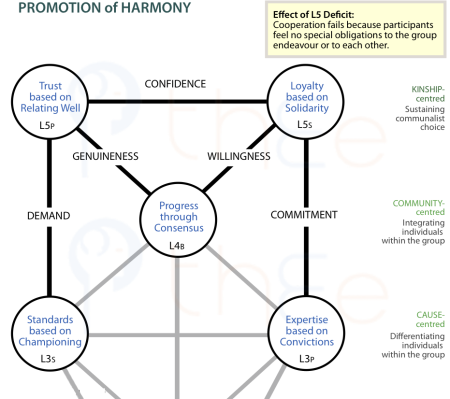Promoting Harmony: L5 Choices
Bonding Smooths Joint Efforts
Participants get to know each other more deeply as they give priority to their common endeavour and work to reach a () that is satisfactory, or at least acceptable, for all.
Deliberate use of kinship-centred principles can deepen the work relationships. Fostering personal bonding and creating over-riding obligations to the joint endeavour helps sustain the communalist position. The resulting willingness to adapt and avoid letting each other down prevents conflicts and helps overcome obstacles.
Review Kinship-centred Principles from a purely personal perspective.
Tension in Cooperation
Does L5-Bonding imply a Participant focus or a Shared-endeavour focus or both? In the kinship-centred realm, choices related to harmony and comfortable relating appear in two distinct forms.
- The participant focus is expressed as choices fostering reliable trusting relationships between individual participants enabling free easy communication and mutual understanding: .
- The shared endeavour focus is on ensuring that a sense of loyalty becomes inculcated, leading to group solidarity: .
These two kinship-centred Centres are linked because:
- Trust based on relating well should strengthen solidarity and increase participants' confidence in the shared endeavour.
- Demonstrations of group solidarity around the joint endeavour should strengthen trust and increase confidence in relating amongst participants.
So we label the Channel ↔ : CONFIDENCE.
Any cooperative endeavour must tolerate membership changes that disrupt personal relations. Group solidarity may put useful pressure on people and control inappropriate relating (e.g. formation of factions). So the Shared Endeavour Centre is dominant over the Participant Centre. Growth of factions would reflect a misalignment and dysfunction.

Influences in Cooperation

Kinship-centred states, being communal-relational in nature, have no direct effect on choices dealing solely with participant-prosperity (), or related to the power-balance (). However, they are linked to the consensus-forming process (), and to specialist issues () in regard to choosing or handling others with whom relating is necessary.
Limitation
Once L5-kinship has been successfully reached, a cooperative effort can be effectively generated and positively pursued without continuing recourse to coercive pressures. However, the wisdom of the endeavour for the group is another matter: it can be done—but should it be done? and, if it should, how can it be done?
Up to now, attention to determining overall worthwhile goals and methods happens in passing. Any significant improvement to the quality of goals and methods must come from inputs at higher Levels. The initial challenge involves looking rather dispassionately at a fuller range of options, possibly coming from outside the group: i.e. .
Originally posted: July 2009